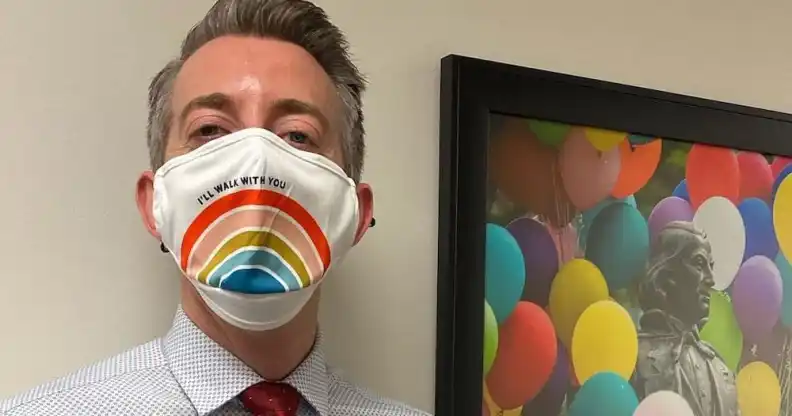Gay Mormon shares heartbreaking story of falling in love with his ‘best friend’ – but never acting on it

Gay Mormon and BYU employee Ben Schilaty. (Instagram/ benschilaty)
A gay Mormon who works at the homophobic, church-operated Brigham Young University (BYU) has described how he fell in love with a man, but they had to remain “best friends”.
Ben Schilaty, 37, is an Honor Code administrator at BYU, a university that is owned and operated by the Church of Jesus Christ of Latter Day Saints (LDS), commonly known as the Mormon church.
The university has come under fire repeatedly for its viciously anti-LGBT+ policies, including a ban on “homosexual behaviour”.
Schilaty told the podcast Mormon Land that he realised he was gay in middle school.
“This wasn’t super distressing to me,” he said, “because it was just a phase and it was going to go away.”
He continued: “I didn’t talk to anyone about being gay, I would have denied being gay… it would go away when I was on my mission.”
However, after Schilaty returned from his mission in Mexico, he realised that he was, in fact, still gay.
Two years later, when he came out to his parents over Thanksgiving, he said: “I knew that my parents were going to be loving and kind, and they were.
“They just responded so well… My dad said, ‘Well, you’re probably better off being single, because being married is hard.'”
Which is exactly what Schilaty did.
Although, many years later, his parents told him they would support him if he had to “leave the church and marry a man”, Schilaty decided to stay and go without ever even kissing a man.
He said he was always sure of his faith, and never felt “angry at God”, but wondered how he could reconcile being gay with being a Mormon.
“I felt really strongly that I want to live a life within the Church of Jesus Christ of Latter Day Saints. I realise that’s my story, that’s not everyone’s story, but that’s what I personally have felt compelled to do.”
Schilaty recently wrote a book, titled A Walk in My Shoes: Questions I’m Often Asked As a Gay Latter-Day Saint, in which he described the experience of being in love with a man even though he had forbidden himself to act on his feelings.
He wrote in the book: “It’s OK to be gay, I’m often told, as long as you don’t act on it… It’s fine to be gay, as long as you don’t do gay things.
“I understood that acting on it included far more than behaviours that violated the law of chastity, including things that heterosexual couples were allowed to act on.
“I was terrified that any little thing I could do could be defined as ‘acting on it’, and would disqualify me from being righteous.
“Acting on it was a firm line, and if I crossed that line, I’d be out.”
Schilaty told Mormon Land that when he found himself in love with a man at the age of 30, he insisted that they remain “best friends”, and it was “the hardest thing he’s ever done”.
As time went on, his “best friend” wanted more from their relationship, and so eventually their friendship ended too.
But despite everything, he said: “Every time I’ve thought about leaving [the church], I just feel pulled to stay even stronger.”
In February 2020, BYU’s Honor Code, which students can be expelled for breaking, was amended to remove the section that bans being gay “behaviour”.
LGBT+ students celebrated by kissing friends and partners of the same gender in various places around campus, but a few days later the university issued a statement saying there had been some “miscommunication”. BYU then backtracked and announced that “same-sex romantic behaviour” will still be outlawed.
Allison Phillips Belnap, who like Schilaty worked at BYU, formerly serving as the assistant dean of its law school, came out as gay last year.
However, unlike the Honor Code administrator, after several years of suppressing her sexuality and several suicide attempts, Belnap decided to leave both the university and the church to live out and proud.
Speaking about the university backtracking on allowing same-sex relationships, she described BYU’s anti-LGBT+ policies as a “dumpster fire”.
She said: “To engender that kind of hope… and then to just sort of rip that away or rip that out from underneath someone, it’s cruel, it’s violent… I think it’s a horrific thing to do to somebody.”

